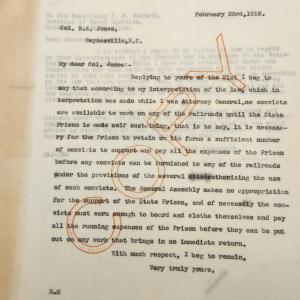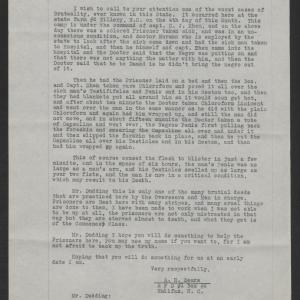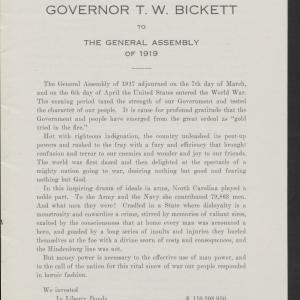COUNTY CONVICTS—WORK ON FARMS.
April 19, 1917.
History Excellency, GOVERNOR T. W. BICKETT, Raleigh, N. C.
Sir:—
Referring to your request of today for an opinion of the Attorney-General with regard to the power of the county commissioners of the various counties of the State to use convicts sentenced to hard labor upon the public roads, for tending certain uncultivated areas of land in the respective counties.
I have to advise you that I not only find no inhibition of such a course in our statutes, but it would seem that express power to use convicts in this manner in conferred under section 1356 of the Revisal, as follows:
"The convicts sentenced to hard labor upon the public roads, under the provisions of the preceding section, shall be under the control of the county authorities, and the county authorities shall have power to enact all needful rules and regulations for the successful working of convicts upon the public roads: Provided, the county commissioners shall have power to work such convicts on the public roads or in canaling the main drains and swamps or on other public work of the county."
The character of work which you have described would seem to fall within the provision "other public work of the county" in the last line of the above quoted statute. If the county commissioners rent or lease farm lands for the purpose of cultivation, it would seem that the working of such lands would be as much a part of the public work of the county as the cultivation of the county farms, which are generally owned by the counties.
A further provision which seems to give authority for the course which you have in mind is contained in section 1352 of the Revisal, which is as follows:
"The board of commissioners of the several counties, within their respective jurisdictions, or such other county authorities therein as may be established, and the mayor and intendant of the several cities and towns of the State, shall have power to provide under such rules and regulations as they may deem best for the employment on the public streets, public highways, public works, or other labor for individuals or corporations, of all persons imprisoned in the jails of their respective counties, cities and towns, upon conviction of any crime or misdemeanor, or who may be committed to jail for failure to enter into bond for keeping the peace or for good behavior, and who fail to pay all the costs which they are adjudged to pay, or to give good and sufficient security therefor," etc.
The foregoing section gives authority to use prisoners for the "public works" of the county, under which designation the working of uncultivated areas under control of the county might be considered as above suggested.
Respectfully submitted,
JAMES S. MANNING,
Attorney-General.




